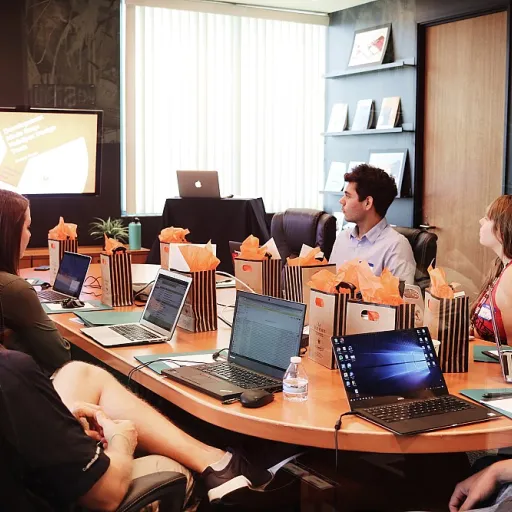
Understanding the role of a competitor research specialist
What Does a Competitor Research Specialist Do?
A competitor research specialist plays a crucial role in helping businesses understand their competitive landscape. This expert focuses on gathering, analyzing, and interpreting data about competitors, market trends, and industry shifts. Their work supports strategic decision-making for marketing, product development, and business growth.
Key Responsibilities and Skills
- Competitor analysis: Conducting in-depth research competitor activities, including digital marketing, SEO strategies, and product launches.
- Market research: Identifying market trends, customer preferences, and emerging threats or opportunities.
- Competitive intelligence: Monitoring social media, web presence, and digital campaigns to assess how competitors engage with their audience.
- Keyword research: Analyzing keywords and search trends to inform SEO and content strategies.
- Reporting and insights: Presenting findings to consultants, business leaders, and marketing teams for actionable strategy development.
Where Do They Fit in the Organization?
Competitor research specialists often collaborate with strategy consultants, marketing analysts, digital marketing teams, and even web developers. Their insights are vital for shaping competitive strategies, refining product design, and supporting consultants business objectives. In some cases, they work alongside virtual assistants or as part of a broader research analysis team.
Why Their Role Matters
With the rapid evolution of digital markets and mobile platforms, having a dedicated competitor analyst ensures your business stays ahead. These experts provide the intelligence needed to adapt marketing strategies, improve services competitor offerings, and make informed decisions in a crowded market. For more on the sourcing process for these roles, see this guide on the role of a sourcing recruiter in recruitment process outsourcing.
Why recruitment process outsourcing is effective for specialized roles
Why Outsourcing Recruitment Works for Niche Roles
Recruitment process outsourcing (RPO) has become a strategic solution for businesses looking to fill specialized positions, such as competitor research specialists. These experts play a crucial role in competitive intelligence, market research, and digital marketing strategy. But why is RPO particularly effective for hiring such niche profiles?
First, the talent pool for competitor analysts and research consultants is limited. Traditional hiring methods often struggle to reach candidates with the right mix of analytical skills, software proficiency, and industry knowledge. RPO providers, however, are equipped with advanced sourcing tools and networks that extend beyond standard job boards. This means they can identify and engage with top competitor research talent, including those with expertise in SEO, keyword research, and digital analysis.
Second, RPO services streamline the hiring process. By leveraging dedicated consultants and virtual assistants, businesses can reduce time-to-hire and ensure a more efficient evaluation of candidates. RPO teams are trained to assess profiles for critical skills in competitor analysis, market research, and strategy design, ensuring only the most qualified analysts reach the interview stage. For more on how screening interviews are optimized in RPO, see mastering the art of the screening interview in recruitment process outsourcing.
Additionally, RPO providers offer flexibility. Whether your business needs a full-time competitor research expert, a part-time analyst, or a project-based consultant, RPO services can tailor their approach. This is especially valuable for organizations in fast-moving sectors like digital marketing, mobile technology, or web development, where competitive analysis and rapid market research are essential.
- Access to specialized talent: RPO connects you with experts in competitor research, analysis, and strategy.
- Efficient processes: Streamlined sourcing, screening, and onboarding for competitive roles.
- Scalable solutions: Adapt hiring to your business needs, whether for ongoing research or one-off projects.
Ultimately, recruitment process outsourcing empowers businesses to secure the right competitor analysts and research consultants, supporting smarter business decisions and stronger market positioning.
Key challenges in hiring competitor research specialists
Common Obstacles in Sourcing Competitor Research Experts
Hiring a competitor research specialist through recruitment process outsourcing (RPO) can be highly effective, but it is not without its challenges. Organizations looking to strengthen their competitive intelligence and market analysis often face several hurdles when searching for the right talent. Understanding these obstacles is crucial for building a successful strategy and maximizing the value of RPO services.
- Scarcity of Specialized Profiles: The demand for professionals skilled in competitor analysis, digital marketing, and research analysis often outpaces the supply. Many businesses struggle to find analysts with hands-on experience in competitive intelligence, keyword research, and market research, especially those who can adapt to fast-changing digital and mobile landscapes.
- Complexity of Required Skills: A strong competitor analyst needs a mix of technical and business skills. This includes proficiency in analysis software, SEO tools, social media monitoring, and the ability to interpret data for actionable strategy. Finding candidates who can bridge the gap between research, marketing, and digital strategy is a persistent challenge.
- Confidentiality and Trust: Since competitor research involves sensitive business information, companies must ensure that consultants or virtual assistants sourced through RPO maintain strict confidentiality. Trust is essential when sharing strategic insights and proprietary data.
- Alignment with Business Goals: Not every expert in market analysis or digital marketing will understand your unique business context. Ensuring that consultants or competitor analysts can align their research with your company’s strategy and objectives is a key concern during the recruitment process.
- Integration with Existing Teams: Even after sourcing the right profile, integrating a new research competitor specialist into your team can be complex. Differences in work culture, communication styles, and expectations around analysis business or design services can slow down onboarding and productivity.
For companies seeking to enhance their competitive edge, overcoming these challenges is essential. Leveraging RPO can help, but it requires a clear understanding of the market, the right sourcing strategy, and a focus on both technical and soft skills. For more insights on how telemarketing can support your lead generation and competitive research efforts, check out this resource on enhancing your business with telemarketing for lead generation.
Best practices for sourcing competitor research specialists through RPO
Building a Targeted Sourcing Strategy
Finding the right competitor research specialist starts with a clear sourcing strategy. Recruitment process outsourcing (RPO) providers can tap into specialized talent pools, including analysts, consultants, and experts with backgrounds in competitive intelligence, digital marketing, and market research. By leveraging their networks and advanced sourcing software, RPO partners identify candidates with proven experience in competitor analysis, keyword research, and digital strategy.Crafting an Effective Job Profile
A well-defined job profile is essential. It should outline the specific skills needed, such as:- Expertise in competitor research and analysis
- Experience with digital marketing, SEO, and keyword research tools
- Ability to interpret market trends and design actionable business strategies
- Familiarity with social media analytics and mobile market research
- Strong communication skills for collaborating with consultants and virtual assistants
Utilizing Multiple Sourcing Channels
RPO providers use a mix of channels to find top competitor analysts. These include:- Professional networks and industry groups focused on competitive analysis
- Job boards specializing in research, digital marketing, and strategy consultants
- Referrals from consultants business networks
- Outreach to web developers and digital experts with relevant analysis experience
Screening for Technical and Analytical Skills
Effective sourcing goes beyond resumes. RPO teams assess candidates’ ability to conduct in-depth competitor research, use analysis software, and deliver actionable insights. They may include practical assessments or case studies focused on market research, digital marketing campaigns, or competitive intelligence projects. This ensures that only candidates with proven expertise in analysis competitor and research analysis move forward.Ensuring Cultural and Strategic Fit
Finally, RPO providers evaluate how well candidates align with the company’s business strategy and culture. This includes assessing their approach to collaboration, adaptability in fast-changing markets, and ability to contribute to long-term competitive strategy. By focusing on both technical and cultural fit, RPO partners help businesses integrate competitor research specialists who can drive meaningful results.Evaluating candidates: what to look for
Essential Qualities and Skills to Assess
When evaluating candidates for a competitor research specialist role, it’s crucial to look beyond just technical expertise. The right profile combines analytical thinking, business acumen, and adaptability to digital trends. Here are some core attributes to prioritize:- Analytical skills: Candidates should demonstrate a strong ability to conduct competitor analysis, market research, and interpret data to inform business strategy.
- Industry knowledge: Experience in your sector—whether it’s digital marketing, software, or mobile—ensures the analyst understands the nuances of your competition and market landscape.
- Technical proficiency: Familiarity with tools for keyword research, SEO, social media monitoring, and competitive intelligence is essential. Look for hands-on experience with platforms like SEMrush, Ahrefs, or similar software.
- Communication skills: The ability to present research findings clearly to consultants, business leaders, and marketing teams is vital for actionable insights.
- Strategic mindset: Top candidates can translate research into recommendations for business strategy, digital campaigns, or product design.
Assessing Experience and Track Record
A strong competitor analyst or research consultant should have a proven history of delivering value. Consider these points:- Portfolio of past projects: Ask for examples of competitor research, market analysis, or competitive intelligence reports they’ve produced.
- References and case studies: Request feedback from previous clients or employers, especially regarding their impact on business outcomes.
- Adaptability: Experience working with virtual assistants, web developers, or digital marketing teams can indicate versatility and collaborative skills.
Evaluating Cultural and Team Fit
Integrating a competitor research expert into your team requires more than technical skills. Assess their ability to:- Work with cross-functional teams, including marketing, strategy consultants, and design professionals.
- Adapt to your company’s workflow, whether you use agile methods, remote collaboration, or hybrid models.
- Communicate effectively across digital channels and contribute to a positive team dynamic.
Testing Practical Abilities
Practical assessments can help verify a candidate’s expertise. Consider:- Assigning a sample competitor analysis or keyword research task relevant to your business.
- Evaluating their approach to research analysis, data visualization, and reporting.
- Reviewing their ability to identify actionable insights and propose strategic recommendations.
Red Flags to Watch For
Be cautious of candidates who:- Rely solely on generic templates for competitor research or market analysis.
- Show limited understanding of your industry’s digital landscape or competition.
- Struggle to articulate the business impact of their research or analysis.
Integrating a competitor research specialist into your team
Onboarding Your New Competitive Intelligence Expert
Bringing a competitor research specialist into your team is more than just handing over a job description. The integration process is crucial for maximizing the value of their expertise in competitive analysis, market research, and digital strategy.Setting Clear Objectives and Expectations
Start by defining the business goals and key performance indicators for your new analyst. Whether the focus is on keyword research for SEO, monitoring competition on social media, or supporting digital marketing campaigns, clarity helps align their research with your company’s strategy. Provide access to the necessary software, data sources, and market analysis tools they’ll need to deliver actionable insights.Facilitating Collaboration Across Teams
Competitor analysts work best when they’re connected to marketing, product design, and web development teams. Encourage regular meetings where your new hire can present findings, share competitor profiles, and discuss implications for business strategy. This cross-functional approach ensures that competitive intelligence informs both tactical and strategic decisions.Providing Ongoing Support and Training
The landscape of digital marketing and competitor research evolves quickly. Offer opportunities for your specialist to attend webinars, access industry reports, or collaborate with external consultants business experts. This keeps their skills sharp and their analysis relevant.Leveraging Virtual Assistants and Technology
Consider integrating virtual assistants or automation tools to support routine research analysis tasks. This allows your competitor research expert to focus on higher-level strategy and in-depth analysis competitor work, rather than manual data collection.- Share internal documentation on your market and competition
- Introduce them to key stakeholders in marketing, design, and software teams
- Set up dashboards for real-time analysis market updates
- Encourage participation in digital marketing and SEO strategy sessions













